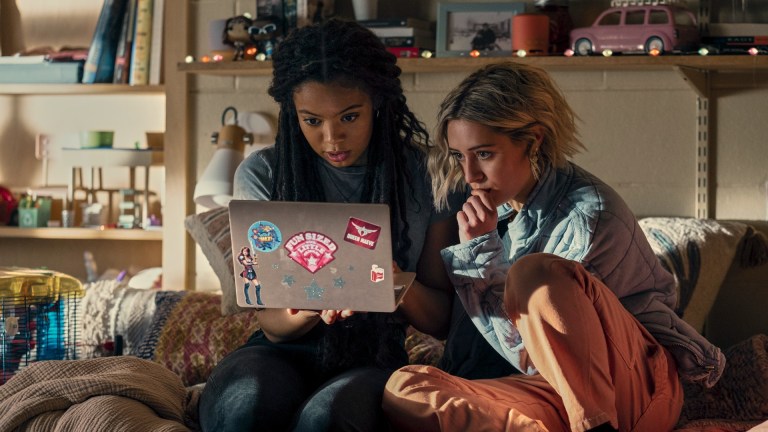Gen V Review: The Boys Can Be a Superhero Franchise After All
The Boys' cynical satire of superheroics seamlessly translates to the world of teen drama.

This Gen V review contains spoilers for episodes 1-3.
As a wise man in a superhero movie once said “you either die a hero or live long enough to see yourself become the villain.” Despite being only a youthful three seasons old, Prime Video’s The Boys currently finds itself in danger of violating Harvey Dent’s rule.
Based on a (mostly awful) comic of the same name, The Boys is about as cynical a superhero satire as you’re ever likely to find. The “supes” in Boys-world are rapists, murderers, fascists, and freaks. And what’s worse, the Vought Corporation propaganda apparatus built around them exists to make them as popular and inoffensive as your friendly neighborhood Spider-Man. The Boys is absolutely scathing in its depiction of a late stage capitalistic system built upon nationalism, hero worship, and misplaced nostalgia.
And now, in a meta twist, The Boys has been compelled to participate in that late stage capitalistic system, itself, in the form of Gen V – the first Boys spinoff of what Prime Video surely hopes is many. Gen V could be dismissively called The Boys‘ own perverse Muppet Babies as it catches up with young supes training at Godolkin University to become the next household name heroes. With this spinoff’s mere existence, The Boys becomes a superhero franchise by default and is therefore the “villain” in its own canon.
How can something satirize the franchizification of superhero storytelling while simultaneously participating in it? Based on Gen V‘s three-episode premiere, the answer to that question turns out to be: quite easily actually! You see, in all my own personal handwringing about to sociopolitical implications of The Boys becoming “IP” for Amazon.com, Inc., I forgot one crucial fact. The Boys rules! And so does Gen V for the most part.
Fittingly, the series opens with Boys-standard geysers of blood. Eight years in the past, the Moreau family is settling in to watch that year’s superhero draft in which A-Train (Jessie T. Usher) will become The Seven’s first ever Black member. A young Marie (later played as a teen by Jaz Sinclair) heads off to the bathroom with a stomach ache, about to experience her first menstrual cycle. Her well-meaning parents enter the room to help out but are immediately, violently killed by the now-pubescent Marie’s suddenly arriving blood bending powers.
In the present day, the still-orphaned Marie is able to gain acceptance into Godolkin University where all the most capable Compound V recipients are able to study for their futures as crime fighters at the Lamplighter School of Crimefighting or the Crimson Countess School of Performing Arts (with both schools’ names being clever Easter eggs for Boys‘ fans). Goldolkin seems to be your typical superhero university, with young hotheaded heroes all competing to be number one in the school’s rankings while also engaging in the usual college debauchery behind the scenes. (Marie’s RA is invisible but also perpetually naked aside from some glasses and a hat).
Things get complicated, however, when episode 1 concludes with the university’s golden boy (fittingly nicknamed “Golden Boy”) Luke Riordan (Patrick Schwarzenegger) killing Professor Brinkerhoff (Clancy Brown) in a fiery inferno before self-immolating himself to death. That kicks off a mystery for Marie to get to the bottom to along with her new peers: metal-bender Andre (Chance Perdomo), shrinker Emma (Lizze Broadway), empath Cate (Maddie Phillips), and gender-shifter Jordan (Derek Luh and London Thor).
Gen V has a couple of major factors working in its favor. The first is its CW teen drama vibe, which has persisted throughout the TV landscape for a reason. In our current streaming era of bloated running times and seasons that feel like movies rather than episodic storytelling, The Boys has always put its showrunner Eric Kripke’s network TV experience (as the creator of Supernatural) to good use, honoring viewers’ attention spans and appreciation for grandiose drama. That tradition continues here under co-showrunners Michele Fazekas and Tara Butters.
There’s almost always something happening of note throughout Gen V‘s first three episodes. The writing and direction prioritizes movement and efficiency and as such the show’s leads are able to be characterized quickly. Marie, Andre, Jordan, and company aren’t necessarily deeply-realized individuals but we immediately know their needs, goals, and insecurities. Most importantly, they all also look like they could kiss one another at any moment, which is always a crucial part of the teen drama equation.
That economy in storytelling also lets Gen V to pack itself to the brim with Boys universe in-jokes and creative applications of how superheroes might operate in our own real world. These first episodes alone feature: several jokes at the MCU’s expense, Homelander cuckhold porn, yet another sex act between a shrinking supe and a penis, shitty Dawn of the Seven director Adam Bourke (P.J. Byrne) sleepwalking through a drama class, and Vought CEO Ashley Barrett (Colby Minifie) having to cancel $35 million in Golden Boy merch.
Still, much of what makes Gen V so compulsively watchable and entertaining is also makes it fall short of greatness. There’s a law of diminishing returns on things like outlandish violence and inside humor. By the time a shrunken Emma crawls through the brains of an anonymous security officer in Godolkin’s “Woods” to rescue Sam (Asa Germann) in episode 3, the shock factor has begun to wear off a bit.
Ultimately, however, Gen V doesn’t appear to be striving for greatness but for something just as elusive. Successfully franchising a concept as antagonistic to franchises as The Boys is no small feat. By embracing the youthful energy of its cast and some solid TV storytelling fundamentals, Gen V is able to somehow make it all work.
The first three episodes of Gen V are available to stream on Prime Video now. New episodes premiere Fridays culminating with the season 1 finale on Nov. 3.
